Divorce can be an emotionally, legally and financially complex process. Couples who share a considerable amount of assets, have young children, or have one spouse who is financially dependent on the other may face additional issues when ending their marriage. Alimony can be an especially heated issue, as many spouses are unable to reach a compromise and cannot decide the issue between themselves. In the event that an agreement cannot be reached, a long and difficult court battle may be the only option for resolving the issue. Couples who find themselves in this situation often need help from an experienced and dedicated family law attorney to ease the process.
How are Spousal Support and Alimony Decided in California?
California judges have a long list of factors to consider These factors are set forth under California Family Code § 4320, and include, but are not limited to, the following:
- Each spouse’s age and health.
- Each spouse’s debts and assets, such as property or vehicles.
- How each spouse’s tax obligations will be affected.
- How long it will take for the recipient spouse to complete the training or education required to become financially independent.
- The ability of the recipient spouse to work without having a detrimental effect on his or her children – for example, how many hours each day can the recipient be away from home? Will he or she need to hire a babysitter, or send the child to daycare?
- The recipient spouse’s marketable skills.
- Whether either spouse has a history of domestic violence, domestic abuse, or other criminal convictions.
- Whether the recipient spouse helped pay for the supporting spouse’s college education or other academic or professional training, and if so, to what extent.
- “The ability of the supporting party to pay spousal support, taking into account the supporting party’s earning capacity, earned and unearned income, assets, and standard of living.”
- “Any other factors the court determines are just and equitable.”
As evidenced by the final factor, this list is not exhaustive and there are many other issues that may come into play when a judge is deciding these issues. An experienced family law attorney can help predict how a judge might weigh these factors.







